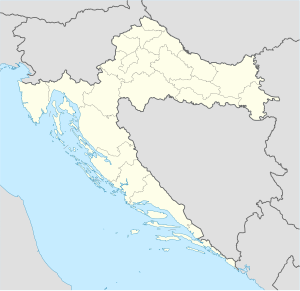The Battle for Glina was an armed conflict between a Knindža unit supported by the JNA against the joint forces of the Ministry of Internal Affairs of the Republic of Croatia and the Croatian Army. Two battles were fought in Glina and both ended in serbian victories as they managed to capture of the police station, which became part of SAO Krajina.
| Battle for Glina in 1991 | |||||||
|---|---|---|---|---|---|---|---|
| Part of the Croatian War of Independence | |||||||
Location of Glina in Croatia | |||||||
| |||||||
| Belligerents | |||||||
|
Supported by: |
| ||||||
| Commanders and leaders | |||||||
|
|
| ||||||
| Units involved | |||||||
|
|
| ||||||
| Strength | |||||||
| 28–29 soldiers & volunteers | 600–650 soldiers and police officers | ||||||
| Casualties and losses | |||||||
|
Unofficial estimate: 2 killed and 1 wounded | 1 killed and 1 wounded | ||||||
Background
editIn January 1991, the Ministry of Internal Affairs of the Republic of Srpska Krajina was founded, which sought to unite all police stations that were not under the control of the authorities in Zagreb.[citation needed]
For this reason, a message was sent to the police stations in Knin, Obrovac, Benkovac, Gračac, Donji Lapac, Titova Korenica, Dvor on Una, Glina, Kostajnica and Vojnić that they have joined the MUP of the RSK. As these were towns with a majority Serbian population, the subordination of the authorities in Knin was mostly voluntary.[citation needed]
Course of the Battles
editFirst battle
editThe first clashes in Glina took place on June 26 of 1991. During these clashes, an infantry group of the Croatian National Guard arrived in the city while there was the Yugoslav People's Army, which according to the statements of Dragan Vasiljković occupied the entire region of Glina, and this is indirectly confirmed by Croatian sources.[1] In short-lived skirmishes, one Croatian policeman was killed, the one in command of the defense 'Tomislav Rom' and another wounded, Ivan Šantek.[1] The Croatian policemen were offered to leave the city and go towards Jukinac. After this retreat, the serb forces marched towards the Glina police station and occupied it.
Second battle
editExactly a month after the first battle, on July 26 of 1991, a group of 21 Kninjas under the command of Dragan Vasiljković entered the city, and with them eight more volunteers. According to the statements of Vasiljković, they came to the reconnaissance and had no idea how many members of the Croatian forces were there, otherwise they would not have attacked the city if they had known that there were between 600 and 650.[2] These volunteers managed to agree with the lieutenant of the JNA, Bojan Drobnjak, that provide them with tank support in the event of an attack on Croatian positions.
The attack on the Croatian positions began, but tank support was absent as Drobnjak and his tank were moved to a new position. However, he managed to fire 4 rockets at the positions of the Croatian forces. It probably had a psychological effect on the Croatian forces leaving their positions and going towards Jukinac, then Gornji and Donji Viduševac , and then completely leaving that territory.[3]
In the short-lived battle, two Serbian volunteers were killed, and one member of the Knindža unit was wounded. Glina remained part of the SAO Krajina until August 6 of 1995 when it was captured during Operation Storm.[citation needed]
References
edit- ^ a b "'We watched on television how the Parliament proclaimed the independence of Croatia, and the next day they attacked us'". Vecernji list (in Croatian). 2015-06-26. Retrieved 2024-05-19.
- ^ "Captain Dragan - We won the battle for Glina". ktv.rs (in Serbian). 2020-08-12. Retrieved 2024-05-19.
- ^ "June 26, 1991 – the bloody war on Banovina began with the attack on Glina". narod.hr (in Croatian). 2015-06-26. Retrieved 2024-05-19.
